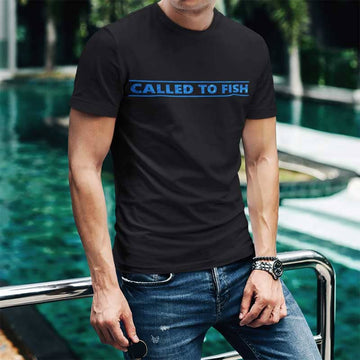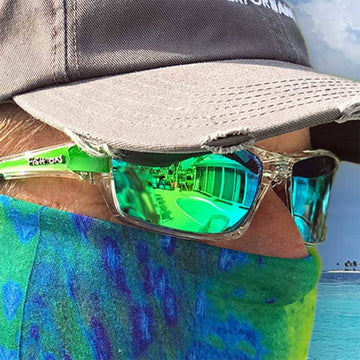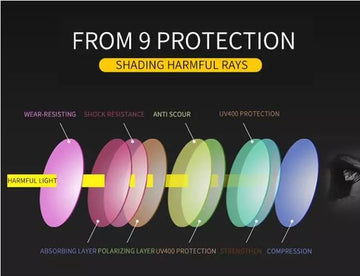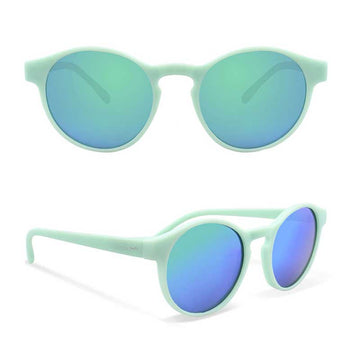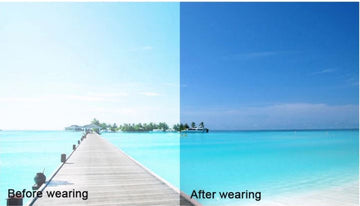Polarized sunglasses are an essential accessory for anyone who spends time outdoors. They protect your eyes from harmful UV rays while also enhancing your vision.
What are the health benefits of wearing sunglasses?
- Most Important: Protecting your eyes from ultraviolet (UV) light's harmful effects is the most crucial reason to wear sunglasses. Skin cancer, age spots, wrinkles, and other health issues are all brought on by UV radiation. Additionally, it harms your eye's lens, which may cause vision loss.
- Sunglasses Protect against UV Light: Just as you wear sunscreen to shield your skin from UV radiation, sunglasses do the same for your eyes. They safeguard your eye's retina and cornea in addition to its eyelids. Wearing sunglasses all year is a good idea because UV light can cause damage even on cloudy or snowy days. Sunglasses also prevent those UV rays from causing skin cancer around your eyelids.
- Sunglasses May Reduce Headaches & Migraines: Wearing the right gear can be an effective way of reducing the frequency and intensity of headaches and migraines. This is especially true when the pain you experience is linked to bright lights or prolonged outdoor activity on a sunny day. If the light is a trigger, many optometrists will recommend wearing sunglasses to prevent headaches and migraines.
- Protective Eyewear Lowers Your Risk of Cataracts: Cataracts are a common concern in the aging population. Without treatment, cataracts can lead to blindness. Protection from UV rays helps prevent the cornea from developing cataracts that could worsen with time.
- Eye Care Prevents Macular Degeneration: When you wear sunglasses, you may also prevent the macula from deteriorating quickly. Macular degeneration can cause blindness, but you may slow declining eyesight by protecting your eyes from the harmful rays of the sun.
- Sunglasses Protect Your Eyes from Debris: If you have ever experienced debris blowing into your eyes on a windy day, you may have realized the positive impact of wearing sunglasses already. Sunglasses can prevent dust, sand, and even pollen from getting into your eye and causing irritation. An optometrist might recommend wearing sunglasses as a physical barrier if you live somewhere with gusty winds.
What lens types are available in sunglasses?
There are two main types of polarized lenses: sunglass lenses and prescription lenses. Sunglasses lenses are available in clear, tinted, and mirrored versions. Prescription lenses come in different strengths and colors. Not all sunglasses manufacturers make their lenses available in your prescription. This requires the service of a licensed optical professional or lab and would effectively replace the existing polarized lenses with an RX lens that may or may not include the lens technology you wanted when you purchased your glasses.
Is it worth buying polarized sunglasses?
You can’t put a price on your vision. Polarized sunglasses contain a virtually invisible filter built into lenses to eliminate the amount of reflecting light that enters the eye. Quality sunglasses should also include additional filter layers that block UVA and UVB ultraviolet radiation from reaching your eyes. Polarized lenses reduce glare, make images appear sharper and clearer, and increase visual clarity and comfort. This is especially beneficial for fishermen or anyone wanting to remove the glare. That’s why fisherman rely on polarized sunglasses to see fish below the surface of the water.
How can you tell if sunglasses are polarized?
Not all sunglasses are polarized, and not all block UVA and UVB rays. One easy way to check if they're polarized is to tilt your head to the left and right while looking at a computer monitor. If the glasses are polarized, the monitor should appear to get brighter and darker as you tilt your head left and right. Unfortunately, there is no easy way to test for UV protection. You will need to take your sunglasses to an optical shop where they can use a special device to test whether your lenses block UVA and UVB rays.
Which is better polarized or UV protection?
While the goal of UV-blocking lenses is to protect your eyes, the point of polarized lenses is to remove glare so you can see more clearly and easily with less squinting and eye strain. These lenses are a favorite among outdoor sports enthusiasts, those participating in water sports, and anyone who dislikes day-to-day glare.
What are the benefits of mirror sunglasses lenses?
Glare is the primary reason people wear sunglasses with mirrored lenses. This type of eyewear prevents too much light from getting into your lenses, which keeps glare from affecting your eyesight. And when you’re driving or participating in an outdoor sport in sunny conditions, this may be crucial to safety.
Mirrored sunglasses have a thin metallic layer on the outside of the lenses that reflects glare away from the sunglasses rather than letting it in, reducing the amount of light entering the eyes. This makes them like a two-way mirror: When observed from the outside of the sunglasses they reflect like a mirror. From the inside, they can be seen through like a window.
You might also like mirrored sunglasses because of their undeniable fashion sense. The lenses can take on multiple colors, giving you the chance to rock your shades in multiple colors that protect your eyes from ultraviolet (UV) light.
Available in Blue, Green, Red, Pink, Purple, Sunburst, or Silver - mirror lenses give you almost unlimited choices to select sunglasses that match your unique style.
What are the special considerations when buying mirrored sunglasses lenses?
While mirrored lenses are stronger than most, you’ll need to take special care of them to resist scratching. Clean the frames and lenses often (following the manufacturer’s recommendations) to keep them in good condition. Most sunglasses brands shy away from Mirror Lenses for one simple reason; They don't want the hassle of customer complaints when their mirror lenses scratch. When you pay $400.00 for a pair of sunglasses, the last thing you want to do is have them scratched after one season. Most of the major brands no longer offer mirror lenses in more than the basic silver just for this reason. While we acknowledge that mirror lenses scratch easily, we want our customers to make that choice for themselves. If you want increased protection against scratches and scuff marks, consider a scratch-resistant or saltwater protective coating.
Check out our Lens Selection Guide for assistance in selecting the right lens for your use.


